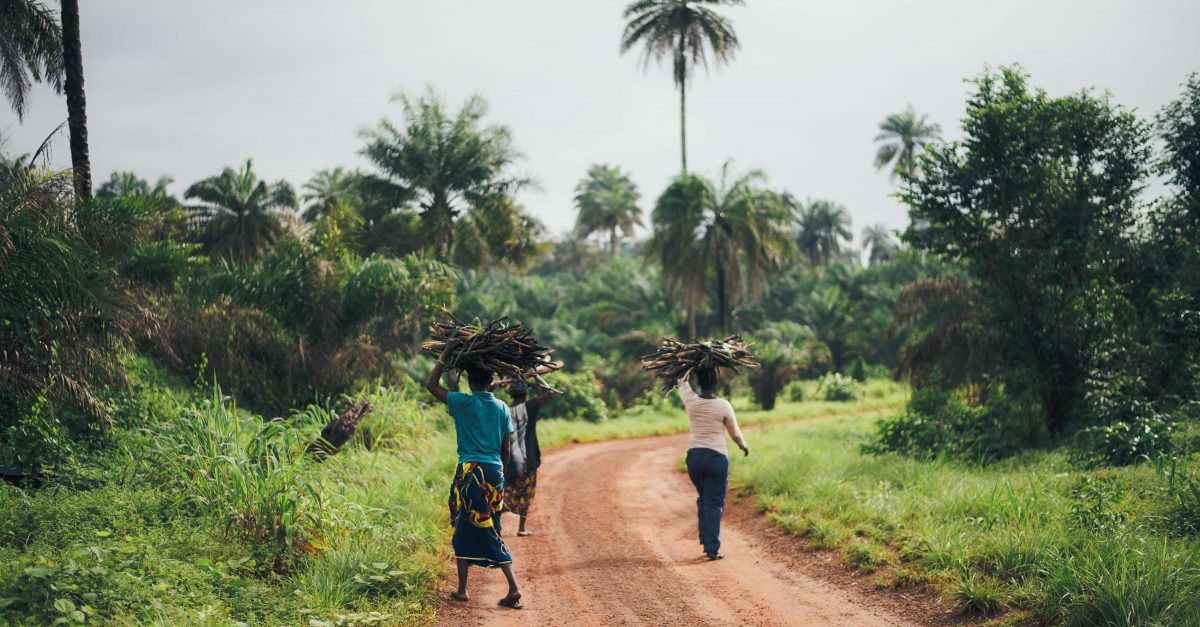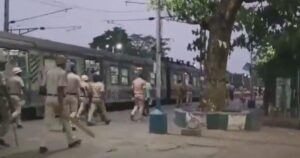Between the Jaldapara forest and the village lay an acre of land, cultivated, furrowed, unweeded. Yards had patches of all sorts of vegetables, maize, and tall lean betel nut trees. Men and women still working on their fields. Children were all barefoot and some of them had running nose. Elderly men and women sat on their haunches on the dusty path, and gossiped.
It was winter. The day was chill and icy. The sun for the whole day hid his face under the veil of smoky clouds. And a mild breeze blew. It added more bitterness to the cold. Still the villagers braved it. They hardly had the luxury of any woolen clothes.
The evening began to descend tip toe. Birds flew over our heads, and sat on a bamboo bush. They chattered and chattered till darkness enveloped the earth.
In a late January afternoon I went to Mundapara. It was a small village by the western outskirts of Jaldapara forest under Moiradanga Gram Panchyat. The tin huts and sheds were scattered. A dry rivulet cut through it and ran zigzag. From the village one could see the tree tops of the forest swaying and singing. The village just stopped touching the edge of the forest.
Between the forest and the village lay an acre of land, cultivated, furrowed, unweeded. Yards had patches of all sorts of vegetables, maize, and tall lean betel nut trees. Men and women still working on their fields. Children were all barefoot and some of them had running nose. Elderly men and women sat on their haunches on the dusty path, and gossiped.
It was winter. The day was chill and icy. The sun for the whole day hid his face under the veil of smoky clouds. And a mild breeze blew. It added more bitterness to the cold. Still the villagers braved it. They hardly had the luxury of any woollen clothes.
The evening began to descend tip toe. Birds flew over our heads, and sat on a bamboo bush. They chattered and chattered till darkness enveloped the earth.
I saw the scattered huts. They lived here years on. On my way to the village I was barred by a drunken man. He was close to 50. A lean, tall man, clothed in a shabby sweater. I stopped my bike. The man walked unstable to me. He threw his hands in a way typical of a drunken man. He spoke loud, but his words all got blurred. His pants loosened down his waist, and he tried to hold it up by his left hand. When he spoke, his mouth all watery, and spit sprinkled out of his stained lips. Seeing the scene men from the fields and women and elderly from the nearby huts crowded me. They pushed him and tried hard to take him out of my path. But every time he was pushed, he automatically like an elastic came before me. I then requested the peasants not to mind him. They all enquired my whereabouts. I made my point and laughed. I did so to lighten the awkwardness of the scene. They were not happy with my designation. They thought me as a timber agent.
If it was not, I perhaps came in search of stolen pure logs of the forest, needed for furniture of a newly built house. They all badly needed money, and the only way to easily have it was to sell some logs, hidden under bushes at the backwards of huts. But when my words touched nothing in which they were interested, they immediately lost interest in me. And perhaps the crowd muttered ‘a good for nothing fellow,’ as my education and cultural baggage had nothing to soften the rough hedges of dried, poverty ridden, unfed, mal-formed, illiterate, sullied life of adivasis.
Suddenly a man, aged almost fifty five, clad in a napkin and a much weather beaten T-shirt, face dull and eyes sank deep under scarred cheeks, came to me, and followed me. He saw a nylon bag stuck to my bike. He peeped into the empty bag, snatched it, and rushed to his field of brinjals. The brinjals were long , and light black. He soon tied the heavy bag to the bike. I protested, but his cosy stubbornness defeated me. He laughed, and greeted me again.
The adivasi with his abysmal poverty, unfed children, and tiny hut was a symbol of pure heart and grace of everlasting humanity. Such a man kept my heart warm, and glowed . The arts of life we learnt from learned spiritual gurus, and enlightened intellectuals. Our media, print, virtual were agog with such gurus. But such a plain heart was rare. The cramming education had derailed lakhs of youths to unknown, and unknowable. Let the elderly be not talked, as they had been sinners for their lifetime. The heroes of our day, were not the enlightened derelicts, not the political humbugs, nor the pious religious men, neither the fortune tellers, and palmists, nor the poor chauvinists. But the real hero was the Kaloo Munda. We were suckers, not the nourishers of our earth. But he was.
After a while, a red monkey capped youth in black sweater and pant, faced me. He was chewing vaaga, and because of the juice of raw betel nut, his lips, and mouth became bright reddish. And the filtered remains of the grinded nuts showcased his lower and upper gums with a thick layer. The young man, not gloom, but he had a cheerful disposition. He had a nubile daughter,reading in class x. A groom, a daily labourer, was found after much afflictions. He didn’t let the chance go. Rs.50000 and a bike, gold , and bedding for the would-be couple for mating would have to be given as dowry. Otherwise, marriage would not see the light of the day. He begged me some rupees. I promised and on my later visit I paid him some rupees, and a sari for his daughter.
Next, I heard from them stories of elephants’ attacks, and damages they caused. They lived in constant fear of the elephants. Earlier they seldom encroached human habitats. But now because of scarcity of food in the jungle, they frequented the villages, and left a trail of ravages. They ate paddy, banana, and other crops and vegetables. They destroyed huts. But we were not afraid of them. We had nothing to do, only to go to bed by the mercy of gods. And the Beat babus helped us. They supplied torches, crackers, patkas, and we lighted fires and beat drums. ” Dada,” a youth called my attention, “you couldn’t believe! When they came, they came in a group of hundreds.” Another man said, ” We came to know their arrival by the chill air. When they came, the air became cold.” An elderly woman pointed me to an abandoned hut destroyed by the mahakaals. She thumped her forehead for the loss, and accused the forest officials for not being compensated.
Her man was aged , eyesight too poor. You couldn’t think that he was blind. And you can’t be blamed either. Because his eyes were liquid, and the pupils all broad, and bare. He looked at me, and I thought he was discovering something in my face. But the old woman told me that his vision was all blurred. And the man also lost his voice a few years back. He sat on a broken plastic chair. His hands trembling, and his eyes hovering around me. His bare legs smeared with dust, and lines of scratching were imprinted on them. It seemed he admired me, as the tan of his wrinkles brightened a bit. In front of his hut was an old tea garden. Plants were all made bare by clipping their leaves and twigs. And men and women were busy in collecting the dried twigs used to be fuels at huts. Now to collect lakhris from the forest is strictly forbidden, and if caught one has to pay huge sum as fine.
The evening descended on earth a while ago, and I left the village soon. It was not completely dark, and the layers of mists already blurred the horizons. I biked to the dry bed of the stream, and stayed there. It was all silent, occasionally broken by the mooing of a cow, long pitched crowing of a cock , and barking of dogs. Birds still chirping, but were unseen. The air was heavy, and sands and dusts forgot to fly. And then through the green vegetation of tomatoes, potatoes, and ploughed fields, yards of betel nuts and pumpkins, gourds sheds, sleepy cottages I came to Kunjnagar haat, and sat for tea at Volu’s. He greeted me with such warmth and joy, and his word “Saaar” made me think that after all my life was not futile. Money, fame and name I didn’t get. But who can hear the sugary “Saaar” in a nameless haat of a nameless village by a nameless man.
Thanks for happy reading!








One comment
I really enjoy the blog post.Really looking forward to read more. Really Cool.